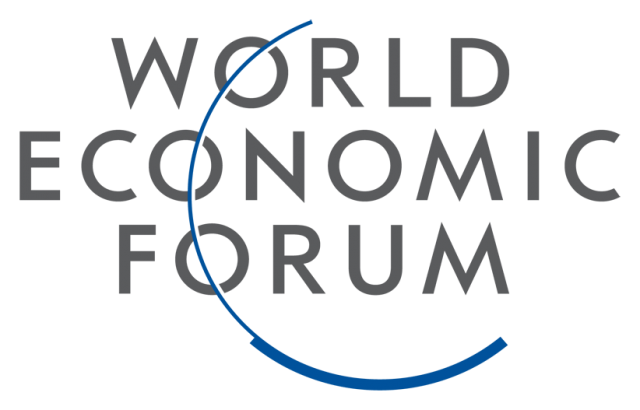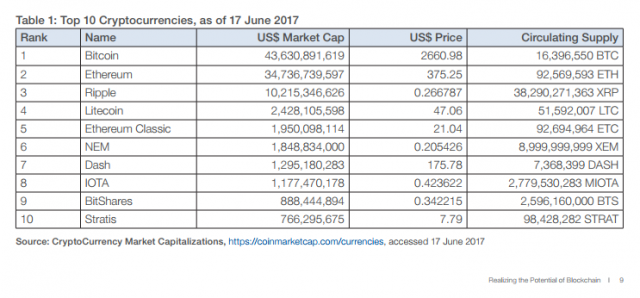
The World Economic Forum just publish a Whitepaper on Blockchain title "Realizing the Potential of Blockchain". The report received a warm reception from the Blockchain community. Some key points to mention:
The WEF reconigze The Blockchain as a New Global Resource
The internet is entering a second era that’s based on blockchain. The last few decades brought us the internet of information. We are now witnessing the rise of the internet of value. Where the first era was sparked by a convergence of computing and communications technologies, this second era will be powered by a clever combination of cryptography, mathematics, software engineering and behavioural economics. It is blockchain technology, also called distributed ledger technology. Like the internet before it, the blockchain promises to upend business models and disrupt industries. It is pushing us to challenge how we have structured society, defined value and rewarded participation.

The WEF identify 8 Players in the Blockchain Ecosystem:
- Blockchain innovators
- Venture capitalists
- Banks and financial services
- Academics and scholars
- Coders and developers
- Non-governmental organizations
- Governments, regulators and law enforcement
- Users
Also identify 7 type of networks that has to be build and operates in consensus, as the Internet did in his infacy:
- Advocacy networks: Respect members interests and constraints
- Networked institutions: Welcome stakeholders everywhere
- Standards networks: Don’t deify differences; codify common ground
- Policy networks: Participate in debate and coordinate regulation
- Knowledge networks: Know what you don’t know
- Delivery networks: Keep incentives for mass collaboration in mind.
- Watchdog networks: Do no harm

The report also come up with some guidelines on what need to be done to Steward this Global Ressource. Here are some:
Networked institutions:
To attract the necessary level of stakeholder participation, we recommend that respected global networked institution (e.g. the World Economic Forum, the Internet Society, the Internet Governance Forum, etc.) convene, through an online platform and a series of meetings, a discussion of the governance issues outlined in this report. The goals would be to (a) include key players in the room; (b) provide participants with the taxonomies and frameworks developed in this report so that everyone has a shared understanding of governance challenges and solutions; and (c) forge some informal actions to improve governance, primarily at the overall ecosystem level, but possibly at the two other levels of governance.
Delivery networks:
The Hyperledger Project, the Enterprise Ethereum Alliance and the Trusted IoT Alliance are three important organizations providing feedback on protocols and doing work at the applications level. Every company, not just technology companies but users of these applications, should join these open initiatives, depending on the platform(s) they have chosen. To build out the necessary infrastructure, we recommend greater outreach to industry associations both at the corporate and professional levels, including outreach to the professional services firms that support them, with the goal of identifying projects as bold and forwardlooking as the Belt and Road Initiative, where they might incorporate blockchain technology to facilitate collaboration, consensus-building, the transparency of reporting and other aspects to increase the efficiency, effectiveness and accountability of project management
Knowledge networks (education):
To address the urgent need for diverse talent and expertise in the ecosystem, every university should be organizing blockchain courses in their computer science programmes and strategic courses in their business programmes, and there should be a massive open online course (MOOC) or series of courses available for credit and certification. We recommend forming an industry-academic collaborative under an organization such as Coursera or edX to encourage the development of advanced programming skills in the blockchain space around the world, potentially modelled after, led by or including such organizations as Coursera, edX, Khan Academy, Stanford Engineering Everywhere, Udacity and other non-profit open education platforms. Such a collaborative would also support the development of course shells and teaching materials across areas of the academy: not just computer science, mathematics and engineering but finance, accounting, operations and logistics, marketing, law, economics, sociology and medicine. Above all, it would be inclusive, perhaps with additional outreach to girls, women and their teachers in regions of need.
I highly recommend everyone to have look.
http://www3.weforum.org/docs/WEF_Realizing_Potential_Blockchain.pdf
Great post
followed , upvoted
keep posting these valuable posts friend.
Hi there its a nice post
if you like me please help me to grow by
upvoting my posts and following me would be great help
Thanks
good post @pnc
I didn't read the entire White Paper but this first sentence just makes me happy:
I really believe in this direction and especially the way Steemit is rewarding content creators. In a few years, we might see everything being rewarded and paid for in a similar way on the internet.
Yep, I also love the fact that the recognize Blockchain as Global Ressource. Steem/Steemit is delivering one for the 7 network to build: Delivery networks: Keep incentives for mass collaboration in mind.
Congratulations @pnc! You have completed some achievement on Steemit and have been rewarded with new badge(s) :
Click on any badge to view your own Board of Honnor on SteemitBoard.
For more information about SteemitBoard, click here
If you no longer want to receive notifications, reply to this comment with the word
STOPBy upvoting this notification, you can help all Steemit users. Learn how here!
Seriously... i think WEF is just for talking about trades and money... What is your opinion for WEF?